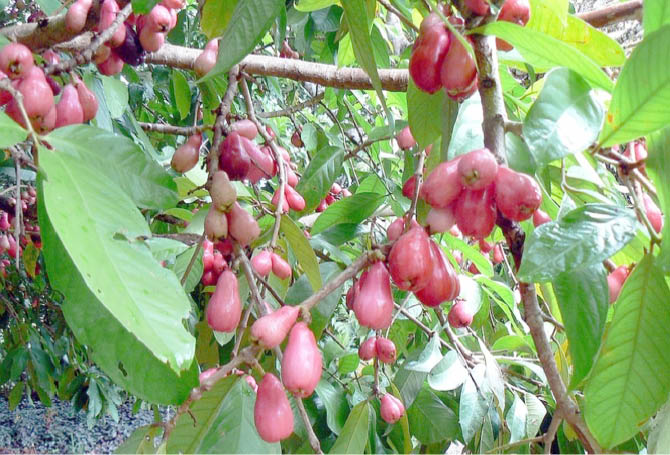By Gbenga Akinyemi
Malay apple is an amazing and unique tropical apple now grown, eaten and sold in Nigeria and many tropical countries of the world.
A delight to the eye in every aspect, the Malay apple tree is admired for the beauty of its flowers and colourful glistering fruits.
Rising fertiliser cost: Kano farmers turn to salt, potassium
Mechanisation: How Syngenta Foundation open up tractors’ access to farmers
As its name suggests, Malay apple originates in the Indo-Malayan region throughout South East Asia’s lowlands and forests.
Malay apple is the biggest apple fruit in the world. It has the highest juice content or moisture of over 90%. It comes in three distinct colours and shapes. The colours are red, green and white. The shapes are oblong, obovoid and bell.
It is appreciated in Nigeria for its sweet-sour taste. Malay apple is loved very much by children and the red variety is the commonest in Nigeria.
Today in Nigeria, the Malay apple trees are present in states like Lagos, Ogun, Oyo, Ondo, Edo, Delta, Rivers, Cross river, Enugu, Abia, Ebonyi and some states in northern Nigeria.
Malay apple is highly nutritious, fibrous and medicinal in nature, and this is evident in the nutrient composition, and a study published in the Scientific World Journal, Food Chemistry and Puerto Rico Health Science Journal.
The Malay apple is strictly tropical. It is intolerant of frost and cold. It prefers year – round rainfall, it can tolerate seasonal rain as long as there is no extended dry period.
Trees grown in areas with a seasonal dry period need to be irrigated during drought. Presently, it is planted in homes, gardens and farms in Nigeria. The tree is prolific in producing about two thousand apples per tree per harvest and having two or three harvests per annum when fully established.
It starts producing apples from the third year of planting. This amazing tropical apple has wonderful health benefits. The flesh of the apple contains epicatechin that contributes greatly to lowering of high blood pressure. It detoxifies the body. It contains water, vitamins and minerals that serve as detoxifiers.
Rich in fibre, it helps in resolving constipation. It helps in hydrating the body because of its high-water content. It helps keep pregnant women hydrated because of inevitable health conditions such as nausea and vomiting which can cause dehydration.
It contains vitamin A for a clearer and sharper vision, Vitamin C and other minerals prevent skin cancer. Malay apple has several medicinal applications. In Cambodia, the roots, leaves and seeds are used to allay fever.
In Malaysia, the powder from the dried leaves is reportedly used on a cracked tongue, a preparation of the root is a remedy for itching and given to alleviate swelling.
The ripe Malay apple is edible and eaten raw. The skin is thin and the flesh is crisp and white. The slightly unripe apples are used for making jelly and pickles. It is processed into both red and white table wines. You can create sweet jams and preserves from ripe Malay apple. Fruit juice is produced by blending with water, straining, and then adding ginger and lime to taste.
You can chop raw pieces of the apple for use in fruit salad and chop into fine pieces and add to salsa recipes.
The young leaves and shoots, before turning green in colour, are consumed raw with rice or are cooked and eaten as greens.
Gbenga Akinyemi is a graduate of Crop Production from the Federal College of Agriculture, Akure, Ondo State and can be reached on 08123979645

 Join Daily Trust WhatsApp Community For Quick Access To News and Happenings Around You.
Join Daily Trust WhatsApp Community For Quick Access To News and Happenings Around You.


